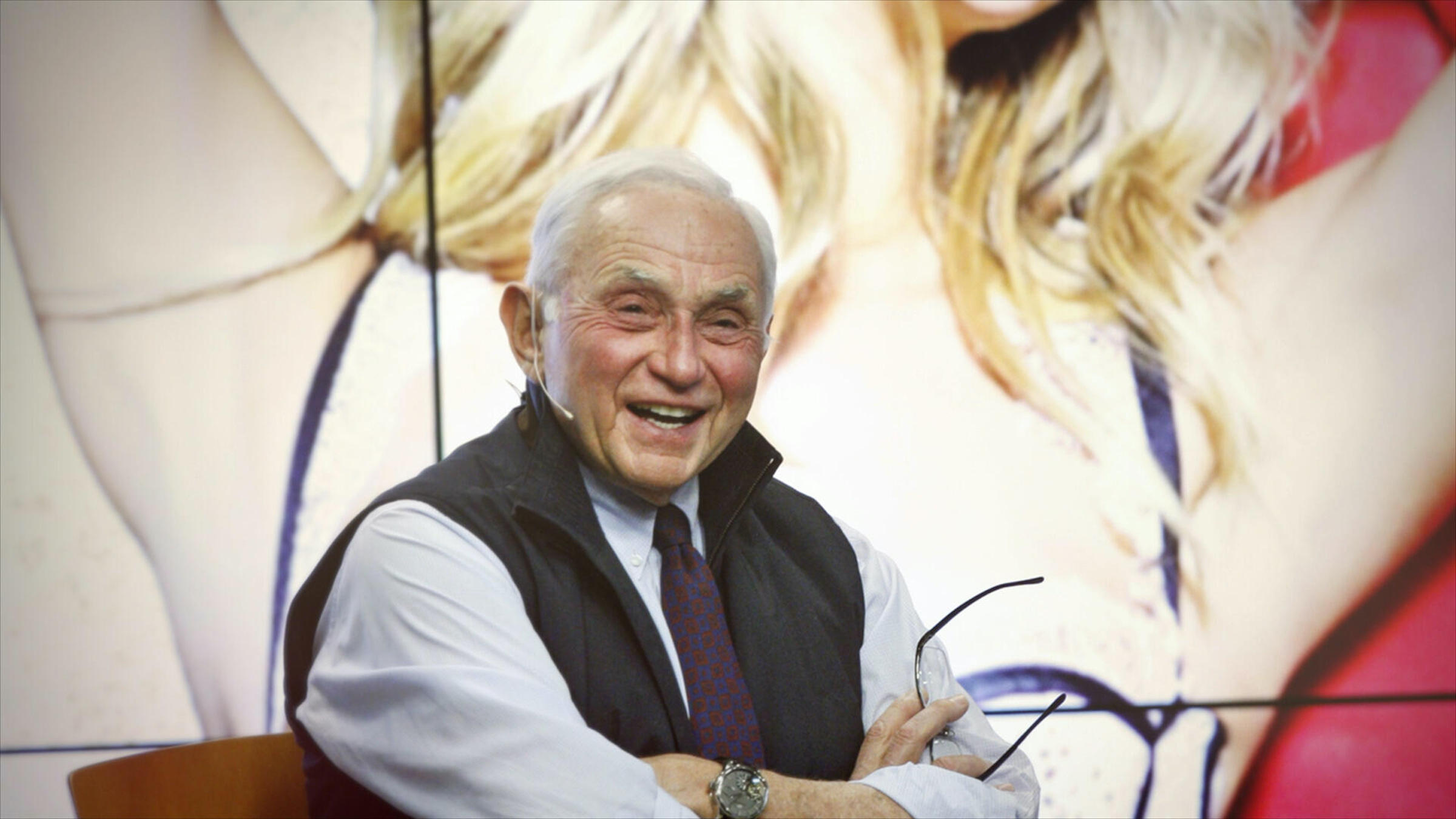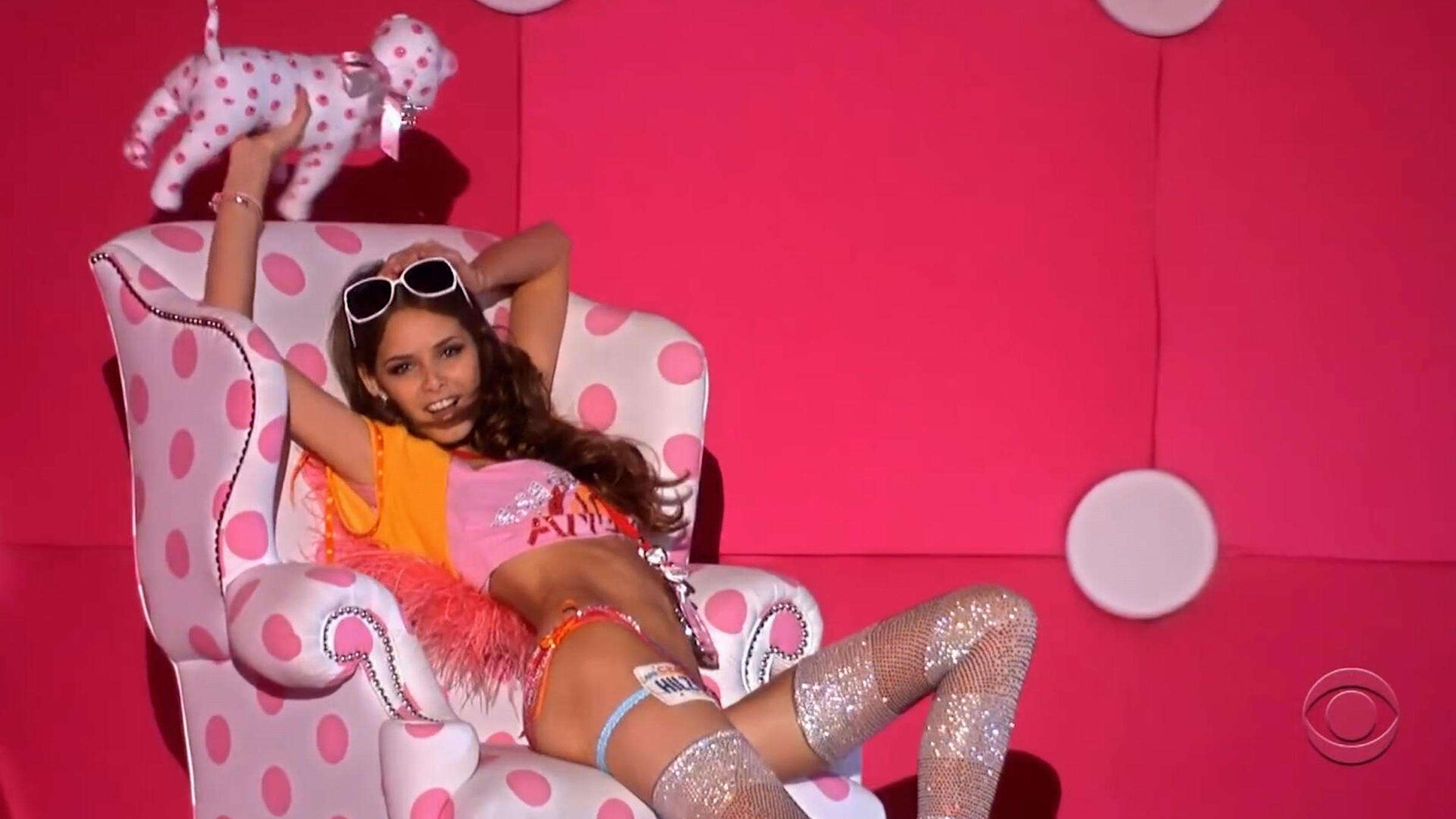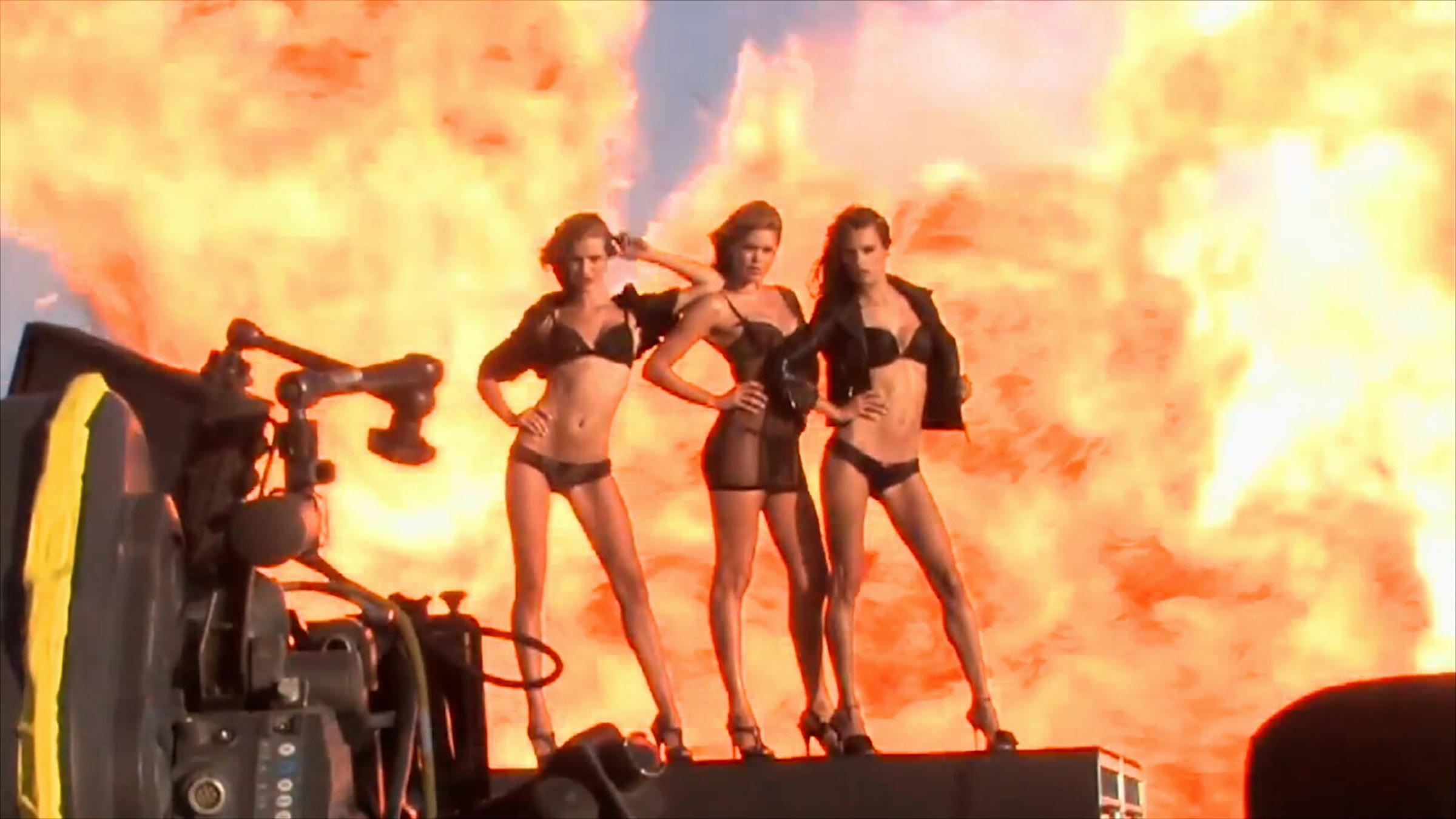Hulu’s three-part documentary series Victoria’s Secret: Angels and Demons looks at the rise and fall of the legendary lingerie brand and its former billionaire CEO, Leslie Wexner. The sprawling docuseries, streaming now, delves in particular into Wexner’s relationship with wealthy financier and convicted sex offender Jeffrey Epstein.
While Epstein’s ties to former presidents Bill Clinton and Donald Trump, as well as Prince Andrew and Bill Gates, have been well publicized, his connection with Wexner flew under the radar until Epstein’s 2019 arrest on sex trafficking and conspiracy charges. (Epstein died by suicide that same year while awaiting trial.) For nearly two decades, Epstein was Wexner’s personal money manager, but few people understood just how close the two were. (Wexner broke ties with Epstein in 2007 following the financial advisor’s arrest for soliciting a minor for prostition a year prior. In 2008, Epstein pleaded guilty and was given a much criticized lenient plea deal.)
Victoria’s Secret: Angels and Demons looks to examine what relationship Wexner and his fortune may have played in Epstein’s alleged sex trafficking network. But without new insight from Wexner, who turned down multiple interview requests from filmmakers, viewers are left with many unanswered questions. Chief among them: why did Wexner continue to do business with Epstein despite his many red flags?
Who is Les Wexner?

The Ohio-born Leslie “Les” Wexner is the billionaire founder of L Brands Inc., the one-time parent company of The Limited, Bath & Body Works, Abercrombie & Fitch, and Victoria’s Secret, the crown jewel of his retail holdings. Wexner bought the lingerie brand in 1982 from its founder Roy Raymond for just $1 million, turning it into a billion-dollar company within the span of a decade. In Victoria’s Secret: Angels and Demons, Wexner is described as a “genius” whose corporate shrewdness and foresight helped him dominate the malls of America. His megalomaniacal focus on retail dominance led him to become the inventor of fast fashion. “He’s the guy who figured out how to make Americans shop, shop, shop, shop, shop,” Teri Agins, the author of 1999’s The End of Fashion, says in the docuseries.
While Victoria’s Secret boasted revenues of $8.1 billion in 2018, the company that was once the mainstream standard bearer of what is sexy struggled to stay relevant in the age of social media and #MeToo. In 2020, after nearly 60 years, Wexner retired as CEO and Chairman of L Brands. (The following year, he left the board of L Brands, breaking all ties with the company he founded in 1963.) With a net worth of $5.8 billion, Wexner is still the richest man in Ohio, but his legacy has been deeply damaged, possibly irrevocably, by his close ties with the late Jeffrey Epstein.
How did Les Wexner meet Jeffrey Epstein?

Epstein and Wexner were reportedly introduced in the mid- to late-’80s by a mutual friend, insurance executive Robert Meister. The two became fast allies. In 2003, Epstein told Vanity Fair that he shared a special bond with Wexner: “People have said it’s like we have one brain between two of us: each has a side.”
In Victoria’s Secret: Angels and Demons, Michael Gross, the author of 1995’s Model, explains that Epstein had a reputation for “worming his way into the lives of older successful Jewish men” ever since his five-year stint working at investment firm Bear Stearns. (Epstein left the company in 1981 for undisclosed reasons, one year after making partner.) A former business partner of Epstein’s said he was “extraordinarily mesmerizing” and “could convince anything of anybody.” This might explain how the former prep school math teacher-turned-private investment advisor landed Wexner as his financial firm’s biggest client despite his lack of experience. (Epstein claimed that he worked with many wealthy people, but Wexner remains his only known client.)
Epstein was named the billionaire’s power of attorney in 1991, which gave Epstein “unmitigated control over all of [Wexner’s] assets,” according to Washington Post reporter Sarah Ellison. He could sign checks, buy and sell property, and borrow money on Wexner’s behalf. “There wasn’t a part of Wexner’s empire that Epstein didn’t have access to and didn’t have some ability to control,” Ellison says in the docuseries.
Why would Les Wexner give Jeffrey Epstein so much control over his life?
That’s the billion-dollar question that no one—including journalists, former employees, and close friends of Wexner—have been able to answer. Wexner has claimed that giving Epstein power of attorney was strictly a business decision, but Victoria’s Secret: Angels and Demons shows that Epstein was just as involved in Wexner’s personal life. He played MC at the billionaire’s 59th birthday party and encouraged Wexner to break ties with anyone he didn’t like. That included Wexner’s mother, Bella, whom Wexner’s foundation sued in order to keep her from taking Epstein’s place on the board of his charity, according to the docuseries. “If my client needs protecting—sometimes even from his own family—then it’s often better that people hate me, not the client,” Epstein once said, according to Vanity Fair.
Epstein’s complete control over Wexner’s finances has led some to question whether the two were romantically involved, but both men have denied rumors that they ever engaged in a romantic or sexual relationship. (Wexner married lawyer Abigail Koppel in 1993.) In the docuseries, Cindy Fedus-Fields, the former CEO of Victoria’s Secret Direct, said that she believes the two men’s friendship was purely transactional—at least, at first. “Wexner had the money that Epstein was seeking,” she says in the docuseries. “And Wexner got from Epstein the glamour and smoothness that he was seeking.” Yet to many the benefits of their friendship appear to be rather one-sided. Wexner remained an outsider in New York City society despite the promise of Epstein’s help while Epstein became rich and powerful thanks to his connection to Wexner and Victoria’s Secret.
Did Jeffrey Epstein use Victoria’s Secret to take advantage of young women?

Epstein never officially worked for Victoria’s Secret, according to a company spokesperson, who told the New York Times in 2019 that “while Mr. Epstein served as Mr. Wexner’s personal money manager for a period that ended nearly 12 years ago, we do not believe he was ever employed by nor served as an authorized representative of the company.” That didn’t stop Epstein from posing as a talent scout for the lingerie brand during the decades in which he worked for Wexner.
In Victoria’s Secret: Angels and Demons, Fedus-Fields says that, in 1993, she had been informed by a fellow female executive that Epstein had been portraying himself as a talent recruiter for Victoria’s Secret. After the exec called Wexler directly, she was told that he would “put a stop to it.” (In a statement included in the series, Wexner’s attorney wrote that his client “confronted Epstein” in 1993 over the allegation that he had been posing as a recruiter and “Epstein denied having done so.”)
But in 1997, model Alice Arden filed a police report against Epstein, who she claimed had invited her to his hotel in Santa Monica, Calif., under the guise that he worked for Victoria’s Secret. In the police report, the then-27-year-old accused Epstein of grabbing her backside, attempting to undress her, and telling her he wanted to “manhandle” her. Epstein long denied Arden’s allegations. In the doc, Wexner in a statement from his attorney “denied that he had any knowledge of Epstein’s sexual misconduct while under his employ”
Still, many former employees and journalists have drawn a direct line from these early allegations of Epstein posing as a Victoria’s Secret talent scout to the 2019 allegations that, between 2002 and 2005, he paid girls as young as 14 for sex and used them to recruit other young girls. In the docuseries, anti-trafficking advocate Conchita Sarnoff makes the case that Epstein was able to “legally bring girls from all over the world into the United States under the guise of modeling” thanks to his position as Wexner’s financial advisor.
Has Les Wexner been implicated in Jeffrey Epstein’s alleged crimes?
Wexner has not been implicated as a co-conspirator in any crimes allegedly committed by Epstein. However, after Ghislaine Maxwell was sentenced to 20 years in prison for helping Epstein sexually abuse underage girls, some are calling for more scrutiny of Epstein’s other associates including Wexner.
Victoria’s Secret: Angels and Demons casts Wexner as the source of Epstein’s wealth, which allowed him to allegedly take advantage of young, often underage girls. The $20 million New York City townhouse that Wexner sold to Epstein is cited in reports as a location used for his alleged abuse. Painter Maria Farmer claimed that she was sexually assaulted by Epstein in 1996 while working on an art project at Wexner’s sprawling Ohio estate where Epstein also lived. A plane previously owned by The Limited, which Epstein reportedly bought from the company for a reduced price, is also referenced in claims made by the financier’s alleged victims. The plane is often referred to in the media as the “Lolita Express” because Epstein allegedly used it to traffic young women to his homes around the globe.
Following Epstein’s arrest in 2019, Wexner reportedly sent a letter to L Brands employees stating that he was “NEVER aware of the illegal activity charged in the indictment” and “would never have guessed that a person I employed more than a decade ago could have caused such pain to so many people.” That same year, he revealed that he had also been a victim of Epstein, who he claimed stole more than $46 million dollars from him. Wexner never pressed charges against Epstein for the misappropriation of funds, which struck Washington Post reporter Sarah Ellison as odd given that the billionaire was known for being litigious. “To allow that level of betrayal and dishonesty to happen unpunished is entirely unexplained,” she says in the doc.
Did Les Wexner’s relationship with Jeffrey Epstein lead to Victoria’s Secret’s downfall?
Victoria’s Secret: Angels and Demons makes the case that Victoria’s Secret’s fall from grace was due to a myriad of factors, including Wexner’s inability to rethink the brand’s image amid the #MeToo movement. But the scrutiny over his ties to Epstein was what ultimately led to his decision to retire as CEO of L Brands, Inc. The three-part documentary paints a damning portrait of Wexner as a CEO who put profits before people, turning a blind eye to allegations of sexual harassment or assault at his company—and not just related to Epstein.
Following model Alice Arden’s 1997 allegation that Epstein pretended to be a Victoria’s Secret recruiter, Wexner continued to support Epstein publicly, telling Vanity Fair in 2003 that the financier was “very smart with a combination of excellent judgment and unusually high standards. Also, he is always the most loyal friend.” But beyond the morass surrounding Epstein, Wexner also appears to have ignored sexual miscoduct allegations against Victoria’s Secret’s former longtime chief marketing officer, Ed Razek, who resigned in 2019 following a disastrous Vogue interview in which he made inflammatory statements about transgender models. In 2020, the New York Times published an exposé on “the culture of misogyny” at Victoria’s Secret, which painted a picture of Razek’s allegedly rampant sexual misconduct. Former executives claimed they had told Wexner about Razek’s alleged behavior, which reportedly included trying to kiss models and asking them to sit on his lap, but nothing was done. (Razek denied the allegations in an email to the Times, and said in a statement to the Angels and Demons filmmakers that he would “not dignify these insane allegations with a response.”)
The documentary details a culture of complicity at Victoria’s Secret, which allowed Epstein to hide in plain sight with Wexner’s help, whether the latter knew it or not. For years, Wexner managed to keep his relationship with Epstein hidden from public view, but now people are looking for answers. Unfortunately, Wexner isn’t talking. “It begs the question, Why?” journalist Sarah Ellison asks in the documentary. “There are questions that he would do well to answer that he has avoided entirely. All the work he put into building this fortune and this business and these brands, there’s a cloud over all of it now.”
More Must-Reads From TIME
- The 100 Most Influential People of 2024
- Coco Gauff Is Playing for Herself Now
- Scenes From Pro-Palestinian Encampments Across U.S. Universities
- 6 Compliments That Land Every Time
- If You're Dating Right Now , You're Brave: Column
- The AI That Could Heal a Divided Internet
- Fallout Is a Brilliant Model for the Future of Video Game Adaptations
- Want Weekly Recs on What to Watch, Read, and More? Sign Up for Worth Your Time
Contact us at letters@time.com